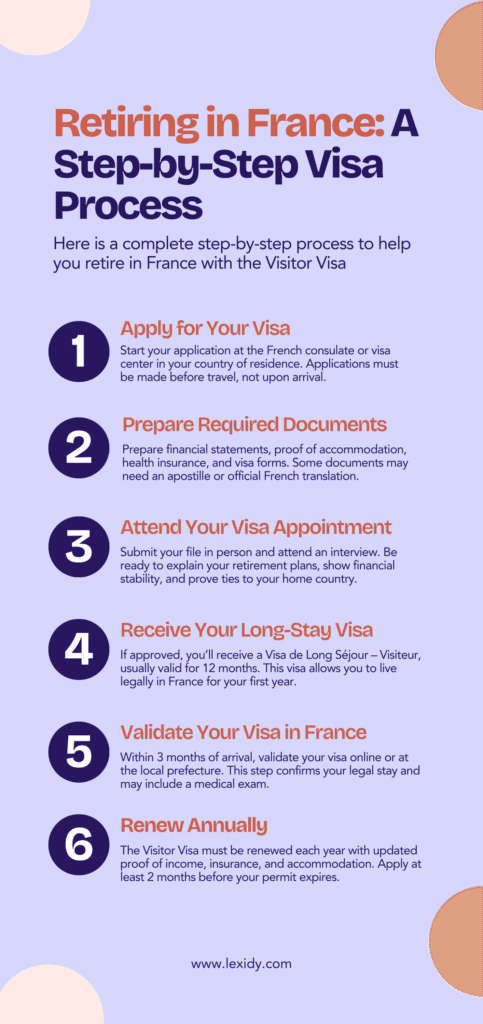Choosing to retire in France is a dream for many, and with good reason. From world-class healthcare and rich culture to peaceful villages and vibrant cities, France offers a lifestyle that combines beauty, security, and comfort.
For Americans retiring in France and other non-EU nationals, the attraction comes from both the lifestyle and the practical benefits of living here. Retirees benefit from high-quality public services, affordable healthcare, and the stability of living in one of Europe’s most connected countries. Once settled, you also enjoy visa-free travel across the Schengen Zone, making France not only a retirement haven but also a gateway to wider European adventures.
In this guide, you will learn how to retire in France, the available France retirement visa options, and the steps to make your move smooth and rewarding.
Table of Contents
- How to Retire in France: Overview of Residency Options
- France Retirement Visa Requirements
- Steps to Apply for a France Retirement Visa
- Living in France as a Retiree
- Taxes and Financial Considerations for US Retirees
- Path to Permanent Residency & Citizenship
- How Our Legal Team Can Help You Retire in France
- Ready to Retire to France?
How to Retire in France: Overview of Residency Options

Do Americans Need a Visa to Retire in France?
Yes. U.S. citizens can visit France visa-free for up to 90 days within a 180-day period under the Schengen Agreement, but this does not permit long-term residence. If you want to retire in France and stay beyond 90 days, you must apply for a long-stay visa (visa de long séjour) through the French consulate in your home country before arrival.
The Main Visa Route to Retire in France: Visitor Visa (Visa de Long Séjour – Visiteur)
The Visitor Visa is the most common France retirement visa for those who are financially independent and do not plan to work. It allows you to live in France legally for an initial 12 months, with the possibility to renew annually.
To qualify, you must show:
- Proof of stable passive income, such as pensions, investments, or savings (at least €1,400 per month for a single applicant).
- Private health insurance that covers your stay in France
- Proof of accommodation, such as a lease, property ownership, or hosted housing
This makes the Visitor Visa the most straightforward pathway for Americans retiring in France and other non-EU nationals, and you can learn more about the process in our France Long-Stay Visa Guide.
Other Possible Options (Less Common for Retirees)
While the Visitor Visa is the main route, other residence permits may apply in specific situations:
- Talent Passport: Designed for entrepreneurs, investors, highly skilled professionals, or internationally recognized artists. While not aimed at retirees, it may suit high-net-worth individuals planning to establish a business or invest in France.
- Family Reunification: If you have close family members, such as a spouse or children, already legally living in France, you may be eligible for residency under family reunification.
Each visa has its own requirements, but for most people retiring in France from the USA or other non-EU countries, the Visitor Visa is the most accessible and reliable pathway to begin a new life in France.
Thinking about retiring in France? Learn how our immigration lawyers make the process smooth and compliant.
France Retirement Visa Requirements
If you plan to retire in France long-term, your best option is most likely to apply for a Visitor Visa if you plan on residing in France without engaging in employment. To qualify, you’ll need to meet several legal and financial documentation requirements.
Key Requirements for the France Retirement Visa
- Valid Passport: Must be valid for at least three months beyond the end date of your intended stay in France.
- Visa Application Form and OFII Form: Completed and submitted to the French consulate. The OFII form registers your arrival with French immigration once you are in France.
- Proof of Sufficient Income: You must show regular, stable passive income such as pensions, annuities, or investment returns. The official France retirement visa income requirement in 2025 is at least €1,400 per month for the main applicant, though this can vary slightly depending on the consulate or prefecture.
- Proof of Accommodation: A rental agreement, property deed, or attestation d’hébergement (a signed letter from a host) confirming your living arrangements in France.
- Private Health Insurance: Must provide full medical and hospitalization coverage valid in France and the Schengen Zone for the duration of your stay.
- No Employment Allowed: The Visitor Visa does not permit paid work or professional activity in France.
These requirements apply to retiring in France from the USA as well as to other non-EU nationals. Once approved, the visa allows you to settle in France with the option to renew annually.
Need help meeting the France Retirement Visa requirements? Let our legal team guide you through each step.
Steps to Apply for a France Retirement Visa

Planning to retire in France means following a structured legal process to secure your long-stay visa and maintain legal residency year after year. Here’s a step-by-step guide tailored for U.S. retirees and other non-EU nationals.
Step-by-Step Guide: How to Apply
- Apply at the French Consulate in Your Country of Residence: Begin your application with the French consulate or visa center that has jurisdiction over your state of residence. This must be done from outside of France, you cannot apply upon arrival.
- Gather the Required Documents: Collect all necessary paperwork, including financial statements, proof of accommodation, private health insurance, and your completed visa forms. It’s important to note that documents like birth certificates or powers of attorney may require apostille certification or official translations into French.
- Attend Your Visa Appointment: Submit your application in person and attend a visa interview. Be prepared to explain your retirement plans, demonstrate financial independence, and show strong ties to your country of residence.
- Receive Your Long-Stay Visa: If approved, you’ll receive a Visa de Long Séjour – Visiteur, typically valid for 12 months. This visa allows you to enter and reside in France legally for your first year.
- Register with the Prefecture and Validate Your Visa: Within 3 months of arrival, you must validate your visa online or at the local prefecture (immigration office). This step registers your legal stay in France and may involve a medical exam or additional documentation.
- Renew Annually Until Permanent Residency: The visitor visa is renewable on a yearly basis. Each renewal requires proof that you still meet the income and insurance criteria.
- To avoid unwanted issues, it’s recommended that you apply for renewal at least two months before your current permit expires.
- A general rule of thumb is to begin your visa application process at least 2–3 months before your intended move to France. The process involves appointments, document review, and sometimes long wait times, especially in peak seasons.
By staying proactive with your annual renewals, you’ll eventually become eligible for permanent residency or even French citizenship.
Living in France as a Retiree

Living in France as a retiree is one of the most rewarding ways to retire in France. Beyond securing your visa, the focus shifts to daily life, from navigating bureaucracy to enjoying the lifestyle that attracts so many retirees from the U.S. and other non-EU countries.
Best Regions to Retire in France
France offers diverse, retirement-friendly regions to match different lifestyles and budgets:
- Provence: Sunny weather, hilltop villages, lavender fields, and Mediterranean charm.
- Dordogne: Popular with British and Americans retiring in France for its quaint villages, affordable living, and relaxed pace.
- Brittany: Cooler climate, rugged coastline, and excellent seafood, perfect for nature lovers.
- French Riviera (Côte d’Azur): Upscale lifestyle, sea views, and strong expat networks in towns like Nice, Antibes, and Menton.
Each region offers a unique side of French culture, and retirees should explore to find their best fit.
Accessing Healthcare in France
Retirees must maintain private health insurance during their first year, which is also a visa requirement. After around one year of legal residence, you can usually apply for France’s universal healthcare system, PUMa (Protection Universelle Maladie). Once registered, you’ll access world-class care at a fraction of U.S. costs, making healthcare one of the biggest advantages for retiring in France.
Cost of Living: U.S. vs. France
While Paris can be expensive, many regions offer a high-quality lifestyle at lower costs compared to the U.S.
| Location | Avg. Rent (1-bed apt) | Monthly Expenses (Single Retiree) |
| Paris | €1,200+ | €2,500+ |
| Nice / Riviera | €900–€1,500 | €2,000–€2,800 |
| Dordogne / Brittany | €500–€800 | €1,500–€2,000 |
| U.S. (national avg.) | $1,300+ | $3,000+ |
Note: Figures are estimates for 2025 and vary by lifestyle and region. Healthcare and insurance costs in France are significantly lower than in the U.S., which is a major benefit for Americans retiring in France.
Integration & Daily Life
Adjusting to French life can take time, especially for those retiring in France from the USA and other non-EU countries, but many expats thrive with the right preparation:
- Language: Learning French makes it much easier to manage healthcare, bureaucracy, and community life.
- Community: Expat groups and Facebook communities exist in most regions.
- Bureaucracy: Expect paperwork for renewals, banking, and utilities; patience helps.
- Banking: Opening a French bank account is essential for paying rent and bills.
- Utilities & Internet: After securing housing, you’ll need to set up electricity, water, internet, and pay local taxes.
With the right mindset and support, retiring in France combines cultural immersion, affordable healthcare, and an excellent quality of life.
Taxes and Financial Considerations for US Retirees

Relocating to France does not exempt Americans from tax obligations in either country. For Americans retiring in France, this means staying compliant with both U.S. and French tax laws. The good news is that international agreements help reduce the risk of being taxed twice.
U.S.–France Tax Treaty: Avoiding Double Taxation
France and the United States have a bilateral tax treaty that helps prevent retirees from paying taxes twice on the same income. Key points include:
- Tax credits or exemptions may apply for income taxed in France, such as pensions or Social Security.
- Each country has the right to tax certain income types. For example, the U.S. continues to tax U.S. pensions, while France may tax investment or rental income.
Because interpretation can be complex, especially with multiple income sources, professional advice is strongly recommended.
Ongoing U.S. Tax Filing Obligations
Even after retiring in France from the USA, American citizens must continue to:
- File annual U.S. tax returns (Form 1040).
- Report worldwide income, including Social Security, pensions, dividends, and French-sourced income.
- Claim credits through Form 1116 (Foreign Tax Credit) to offset double taxation. Note: The Foreign Earned Income Exclusion (Form 2555) generally does not apply to retirement income like pensions or Social Security.
Reporting Foreign Assets (FBAR & FATCA)
U.S. retirees must also comply with financial reporting rules:
- FBAR (FinCEN Form 114): Required if foreign bank account balances exceed $10,000 in aggregate during the year.
- FATCA (Form 8938): Required for larger holdings in foreign financial assets.
These rules apply even if no tax is owed, and penalties for non-compliance are steep.
Consider a Cross-Border Tax Advisor
Managing taxes when you retire in France involves coordinating two systems. To make the most of your retirement income and avoid costly mistakes, it is highly recommended to:
- Work with a tax advisor experienced in U.S.–France taxation.
- Plan withdrawals from retirement accounts (401k, IRAs) strategically.
- Review whether certain income sources, such as Roth IRAs or annuities, create complications in France.
Smart planning ensures compliance and helps protect your income throughout retirement.
Path to Permanent Residency & Citizenship

For those who choose to retire in France, the process does not end with a temporary visa. Over time, your France retirement visa can open the door to long-term residency and even citizenship, provided you meet the legal requirements and demonstrate integration into French society.
Long-Term Residency: Carte de Résident
After five consecutive years of legal residence in France under a valid long-stay visa, such as the Visitor Visa, you may apply for the Carte de Résident. This renewable 10-year permit allows you to live in France long-term without the need for annual renewals.
To qualify, you must show:
- Continuous residence in France
- Financial stability
- Integration into French society
- Compliance with French residency laws
In some cases, such as strong family ties to France or partial French ancestry, early access to this permit may be possible. For most people retiring in France, however, the five-year timeline applies.
Citizenship by Naturalization
French citizenship is the final step for many expats, including Americans retiring in France and other non-EU nationals. The standard requirement is 10 years of continuous legal residence. This period may be reduced to 5 years if you studied in France for at least 2 years, served in the French military, or made a significant contribution to French society.
Applicants must also demonstrate:
- At least B1 level French language proficiency
- Knowledge of French culture and civic values
- Stable income and good moral standing
Once approved, you gain full French nationality, including an EU passport, political rights, and the ability to live and work freely across the European Union.
No Golden Visa in France
Unlike some EU countries, France does not offer a “Golden Visa” program. Simply buying property or transferring funds into a French bank account does not grant residency or citizenship. France’s path to permanent residency and citizenship depends on legal residence, integration, and time spent living in the country, not passive investment.
Want to avoid costly mistakes? Get legal clarity on retiring in France.
How Our Legal Team Can Help You Retire in France

Navigating French bureaucracy can feel daunting, especially for Americans retiring in France or other non-EU nationals planning their move. Expert legal support ensures you avoid delays, meet all requirements, and make the transition as smooth as possible.
What We Offer
- Personalized Visa Strategy: Guidance on the best legal pathway to retire in France, including the France retirement visa (Visitor Visa) and alternative options.
- Complete Application Support: Assistance with gathering documentation, booking consulate appointments, and submitting your file correctly.
- Coordination with French Authorities: Direct communication with consulates, prefectures, and OFII offices to streamline approvals and renewals.
- Certified Translations & Document Prep: Handling official translations, notarizations, and formatting required by French authorities.
- Tax Advisory & Financial Setup: Connections with cross-border tax professionals for U.S.–France tax planning, pensions, and banking.
- Relocation & Renewal Assistance: Ongoing support with residence permit renewals, healthcare registration, and other post-arrival needs.
Relocating should be about enjoying your new chapter, not struggling with paperwork. If you’re retiring in France from the USA or another non-EU country, our legal team makes the process clear, compliant, and stress-free.
Ready to Retire to France?
Choosing to retire in France is an exciting step, and it continues to be one of the most attractive options for international retirees. From world-class healthcare to a relaxed lifestyle, France offers the perfect setting for your golden years.
Of course, retiring abroad also means navigating the France retirement visa process, proving sufficient income, and handling French administrative requirements. With expert legal guidance, you can simplify the process, avoid costly delays, and feel confident about your move, from your first visa application through to permanent residency or even citizenship.
If you’re serious about retiring in France from the USA or another non-EU country, now is the time to take the next step. Fill out the form below and our French immigration experts will help you begin your journey.

